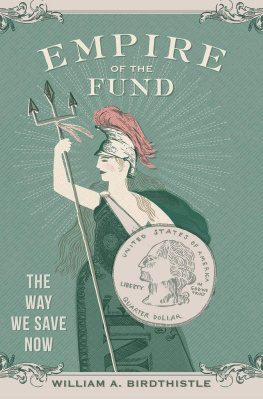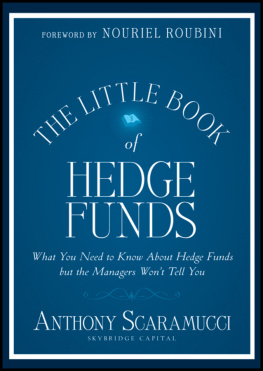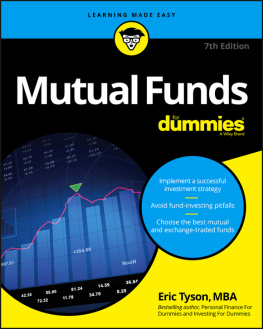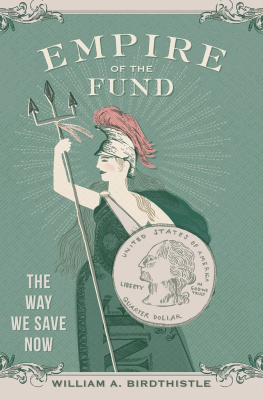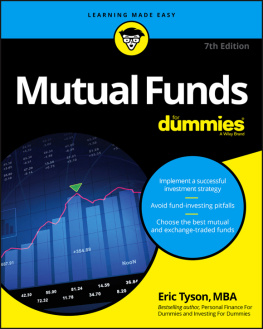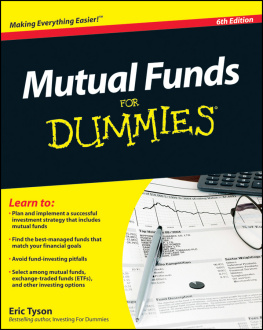Empire of the Fund
Empire of the Fund

The Way We Save Now

WILLIAM A. BIRDTHISTLE


Oxford University Press is a department of the University of Oxford. It furthers the Universitys objective of excellence in research, scholarship, and education by publishing worldwide. Oxford is a registered trade mark of Oxford University Press in the UK and certain other countries.
Published in the United States of America by Oxford University Press
198 Madison Avenue, New York, NY 10016, United States of America.
Oxford University Press 2016
All rights reserved. No part of this publication may be reproduced, stored in a retrieval system, or transmitted, in any form or by any means, without the prior permission in writing of Oxford University Press, or as expressly permitted by law, by license, or under terms agreed with the appropriate reproduction rights organization. Inquiries concerning reproduction outside the scope of the above should be sent to the Rights Department, Oxford University Press, at the address above.
You must not circulate this work in any other form and you must impose this same condition on any acquirer.
Library of Congress Cataloging-in-Publication Data
Names: Birdthistle, William A., author.
Title: Empire of the fund : the way we save now / William A. Birdthistle.
Description: New York, NY : Oxford University Press, 2016. |
Includes bibliographical references and index.
Identifiers: LCCN 2016007563 | ISBN 9780199398560 (hardback) | eISBN 9780199398584
Subjects: LCSH: Mutual fundsUnited StatesHistory. | Saving and investmentUnited StatesHistory. | BISAC: BUSINESS & ECONOMICS /
Investments & Securities. | BUSINESS & ECONOMICS / Personal Finance / General. |
LAW / Business & Financial.
Classification: LCC HG4930 .B47 2016 | DDC 332.63/27dc23
LC record available at http://lccn.loc.gov/2016007563
For Alison.
To Elspeth, Isolde, and Alana.
CONTENTS
I thank my colleagues and friends for their extremely helpful comments, especially Lori Andrews, Kathy Baker, Jack Bogle, Larry Cunningham, John Demers, Tamar Frankel, John Kastl, David LaCroix, David Lat, John L., John Morley, B. Carruthers McNamara, Frank Partnoy, John Rekenthaler, and Christopher Schmidt. Many students provided valuable research assistance, particularly Priya Gopalakrishnan, Gordon Klein, Matthew McElwee, Ashley Montalbano, and Jessica Ryou.
I thank Faber and Faber Limited for kind permission to quote the lines from Philip Larkins poem, Toads.
I greatly appreciate Scott Parris, Cathryn Vaulman, and Oxford University Press for their support of this project, Carole Berglie for her skillful editing, and Eunice Moyle for her stylish design.
I am most grateful for Alison, Elspeth, Isolde, and Alana.
Nearly 80 million baby boomers will file for retirement benefits over the next 20 yearsan average of 10,000 per day.
Social Security Administration, Annual Performance Plan for Fiscal Year 2012
Over the past 30 years, America has embarked on a grand experimentperhaps the richest and riskiest in our financial historyto change the way we save money. The hypothesis of our experiment is that millions of ordinary, untrained, and busy citizens can successfully manage trillions of dollars in a financial system dominated by wealthy, skilled, and powerful investment firmsfirms that on many occasions have treated investors shabbily. As ten thousand baby boomers retire from the workforce each day and look to survive for almost two decades largely on the mutual funds in their personal accounts, we will soon learn whether our massive experiment has been a success. And if not, we will also soon discover just how enormous the costs of failure will be.
Just a single generation ago, large numbers of Americans enjoyed the protection of a pension offered by their employer. The typical pension guaranteed its beneficiaries a steady stream of payments from their retirement until their death. Together with the benefits of Social Security, pensions provided secure retirements to millions of working Americans.
Today, the benefits of Social Security and pensions look alarmingly inadequate. The average monthly benefit for retirees from Social Security is now $1,335, or just over $16,000 per year. Americans in the future will have to support themselves far more on the success or failure of their personal investment accounts.
We as a nation have chosen to entrust our savings not to large pools overseen by professional asset managers but instead to the smaller, individual accounts of almost 90 million investing amateurs. In the argot of the investment world, Americans are losing defined benefit plans, such as pensions, and are being directed into defined contribution plans, such as 401(k)s.
The rise of these individual accounts has, in turn, funneled massive amounts of retirement savingsmore than $6.9 trillioninto one of the most popular investment options in personal accounts: the mutual fund. American investments have built an empire of 8,000 funds holding more than $16 trillion.
The way we save now may enable some Americans to earn comfortable returns in the years ahead, but is also likely to leave many others disappointed. Though mutual funds and 401(k) plans may feel familiar to many of us, in fact they present a number of challenges and dangers to lay investors.
The primary consequences of our new approach, for instance, are that ordinary Americans now find themselves responsible for deciding whether to enroll in an investment account, what amount of each paycheck to contribute to that account, and how to invest those savings successfully for up to forty years of a career and for decades more in retirement. As Thomas Friedman observes, It is a 401(k) world: Government will do less for you. Companies will do less for you.
Though the rhetoric of individual choice may appeal greatly to the American psyche, this change also brings personal liability for getting any of these difficult decisions wrong. And we are getting them wrong: approximately one-third of U.S. households currently have no retirement savings at all. Of the remaining two-thirds, those who have accumulated nest eggs have enthusiastically vouchsafed them to the mutual fund. So if there are any problems in that particular basket, American investors will find themselves extremely exposed to those vulnerabilities.
As we will see, funds do suffer from a number of problems. By illustrating the structural vulnerabilities in mutual funds, the perverse incentives of fund managers, and the litany of scandals that have bedeviled the investment industry, this book attempts to forewarn and forearm Americans. To negotiate our new investing paradigm successfully, Americans will need a greater understanding of mutual funds, more transparency from the financial firms that manage them, and stronger enforcement by prosecutors of the regulations that govern funds.
This book also proposes an alternative way for Americans to invest their savings, one that is less expensive and more scrupulously managed than the mutual funds in which individuals can participate today. By pooling the bargaining strength of millions of investors into a powerful savings plan, Americans could enjoy the benefits of both individual control and economic security.

